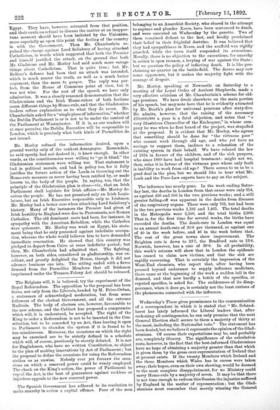Mr. Morley refused the information desired, upon a ground worthy
only of the rankest demagogue. Rossendale, he said openly, had not desired it; it knew enough. In other words, as the constituencies were willing to " go it blind," the Gladstonian statesmen were willing too. That statement is bad in political morale, and bad in policy too, for it fully justifies the future action of the Lords in throwing out the Home-rule measure as never having been ratified by, or made known to, the body of the people. In saying, too, that the principle of the Gladstonian plan is clear—viz., that an Irish Parliament shall legislate for Irish affairs—Mr. Morley de- ceives the people. He has not promised only an Irish Legis- lature, but an Irish Executive responsible only to Irishmen. Mr. Morley had a better case when attacking Lord Salisbury's history. Many of the instances the Premier had given of Irish hostility to England were due to Protestants, not Roman Catholics. The old dominant caste had been, for instance, in sympathy with the American Rebellion, while the Catholics were quiescent. Mr. Morley was weak on Egypt, his state- ment being that he only protested against indefinite occupa- tion, whereas the whole world believes him to have demanded immediate evacuation. He showed that this country was pledged to depart from Cairo at some indefinite period ; but then, Mr. Chamberlain had admitted that. The fighting, however, on both sides, considered as gladiatorship, was ex- cellent, and greatly delighted the House, though it did not advance business one iota. The sitting ended with a fierce demand from the Parnellite Members that all Irishmen imprisoned under the Treason-Felony Act should be released.


































 Previous page
Previous page